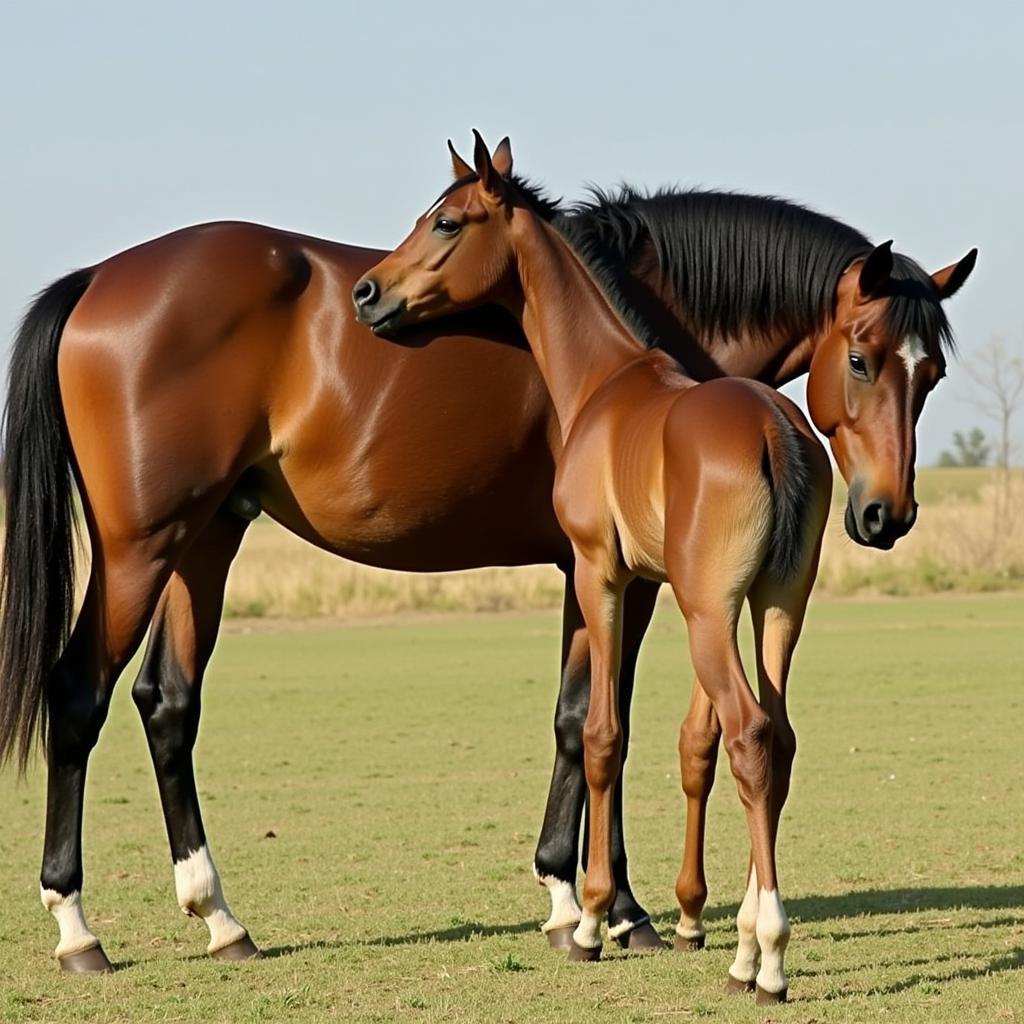Horse breeding is a complex and fascinating subject, encompassing various aspects of equine reproductive health and management. This guide aims to provide a comprehensive overview of horse breeding, addressing key considerations for responsible and successful practices. We will explore the natural breeding process, artificial insemination, and best practices for ensuring the health and well-being of both mares and stallions.
The Natural Breeding Process in Horses
Natural horse breeding involves the instinctive mating behavior of mares and stallions. Understanding this natural process is crucial for successful breeding. The mare’s estrous cycle plays a significant role, influencing her receptivity to the stallion. Factors such as nutrition, environmental conditions, and overall health can impact the mare’s fertility. Similarly, the stallion’s reproductive health, including semen quality and libido, is essential for successful breeding. Observing and understanding these natural behaviors is critical for breeders.
The process begins with courtship, where the stallion displays characteristic behaviors to attract the mare. Once the mare is receptive, mating occurs. This natural process has evolved over millennia and remains the foundation of horse breeding.
Artificial Insemination (AI) in Horses
Artificial insemination (AI) is a valuable tool in modern horse breeding, offering numerous advantages. AI allows breeders to access superior genetics from stallions located far away, reducing the risks and costs associated with transporting horses. It also enables the breeding of mares with physical limitations or those who are unable to conceive naturally. Furthermore, AI plays a vital role in preserving valuable bloodlines and managing genetic diversity within horse populations.
The AI process involves collecting semen from the stallion and then carefully inseminating the mare at the optimal time during her estrous cycle. This requires specialized equipment and expertise to ensure successful fertilization.
Best Practices for Healthy Horse Breeding
Responsible horse breeding prioritizes the health and well-being of both mares and stallions. This includes providing optimal nutrition, regular veterinary care, and a stress-free environment. Proper management of the mare’s estrous cycle and careful selection of breeding pairs are also essential for maximizing fertility and producing healthy offspring.
“Ensuring the health of the breeding animals is paramount,” says Dr. Sarah Miller, DVM, an equine reproduction specialist. “A healthy mare and stallion are the foundation of a successful breeding program.”
Before breeding, both the mare and stallion should undergo thorough health checks, including reproductive examinations and testing for infectious diseases. This helps minimize the risk of transmitting diseases and ensures the best chance of a healthy pregnancy.
 Healthy Horse Breeding Practices: Mare and Foal in Paddock
Healthy Horse Breeding Practices: Mare and Foal in Paddock
Conclusion: Breeding Horses Responsibly
Horse breeding is a rewarding but demanding endeavor. By understanding the natural breeding process, utilizing modern techniques like AI, and adhering to best practices for equine health, breeders can contribute to the preservation and improvement of horse breeds worldwide. Remember, responsible breeding prioritizes the welfare of the animals and ensures the long-term health and sustainability of the equine population. Understanding the intricacies of horse reproduction is essential for achieving success in this complex and fascinating field.
FAQ
- What is the typical gestation period for a mare? (Around 340 days)
- What are the signs of a mare in estrus? (Frequent urination, tail raising, winking of the vulva)
- What is the best time to breed a mare? (Near ovulation, typically determined through veterinary monitoring)
- What are the benefits of artificial insemination in horses? (Access to superior genetics, reduced risk of disease transmission)
- How can I ensure the health of my breeding horses? (Proper nutrition, regular veterinary care, stress-free environment)
- What are some common breeding challenges? (Infertility, difficulty conceiving)
- What is the role of a veterinarian in horse breeding? (Reproductive health checks, monitoring estrous cycle, assisting with AI)
For assistance with your horse breeding needs, please contact us. Phone: 0772127271, Email: [email protected] Or visit us at: QGM2+WX2, Vị Trung, Vị Thuỷ, Hậu Giang, Việt Nam. We have a 24/7 customer service team.